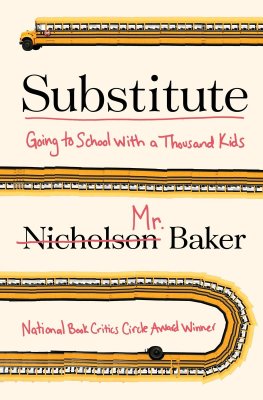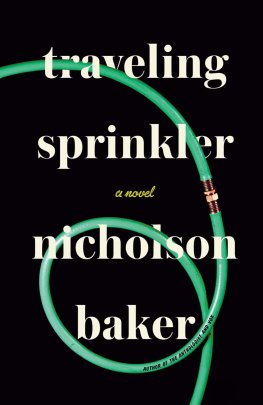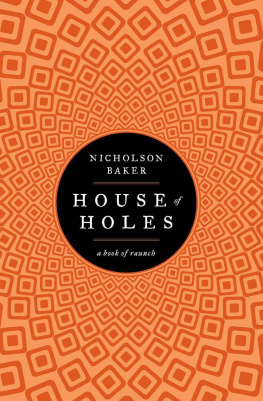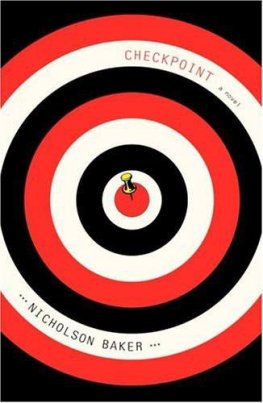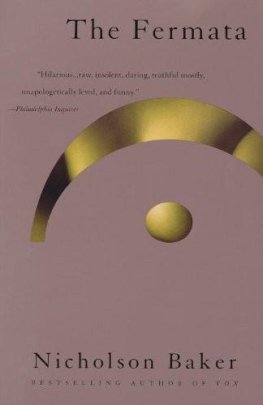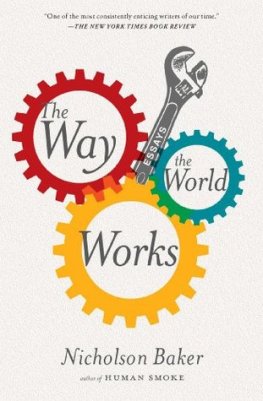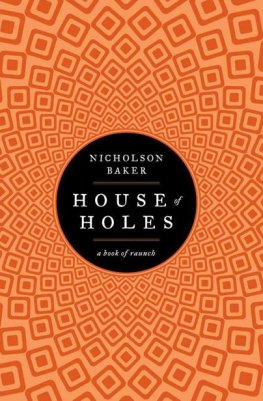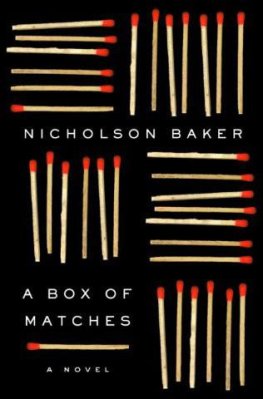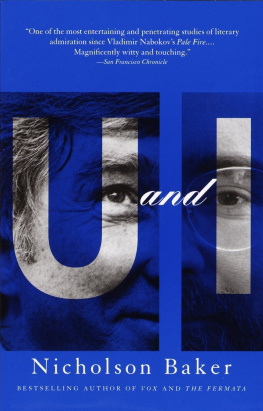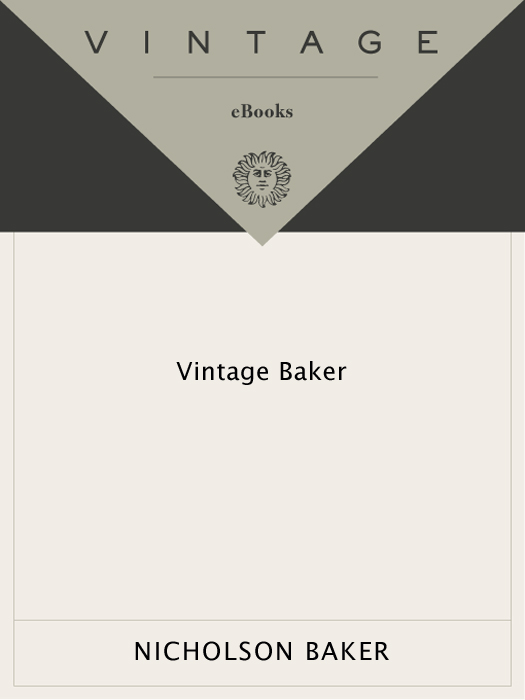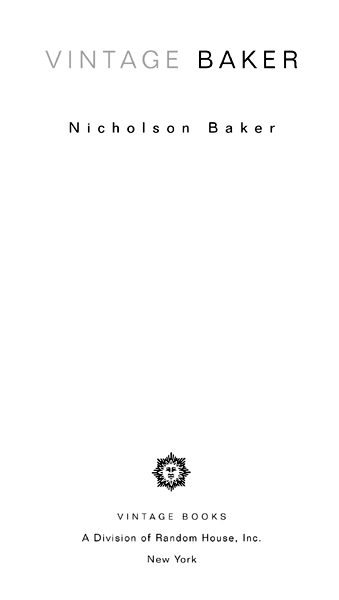Nicholson Baker was born in 1957 and attended the Eastman School of Music and Haverford College. He has published seven novelsThe Mezzanine (1988), Room Temperature (1990), Vox (1992), The Fermata (1994), The Everlasting Story of Nory (1998), A Box of Matches (2003), and Checkpoint (2004)and three works of nonfiction, U and I (1991), The Size of Thoughts (1996), and Double Fold (2001), which won a National Book Critics Circle Award.
BOOKS BY NICHOLSON BAKER
The Mezzanine
Room Temperature
U and I
Vox
The Fermata
The Size of Thoughts
The Everlasting Story of Nory
Double Fold
A Box of Matches
Checkpoint
A VINTAGE ORIGINAL, OCTOBER 2004
Copyright 2004 by Nicholson Baker
All rights reserved under International and Pan-American Copyright Conventions. Published in the United States by Vintage Books, a division of Random House Inc., New York, and simultaneously in Canada by Random House of Canada Limited, Toronto.
Vintage and colophon are registered trademarks of Random House, Inc.
The pieces in this collection were published as follows:
Chapter One, Two, and Three from The Mezzanine, copyright 1988 by Nicholson Baker. Used by permission of Grove/Atlantic, Inc. The selection from Vox, copyright 1993 by Nicholson Baker. The selection from The Fermata copyright 1994 by Nicholson Baker. Rarity, The Projector, Reading Aloud, Leading with the Grumper, and Lumber from The Size of Thoughts copyright 1996 by Nicholson Baker. Chapter One and Two from Double Fold, copyright 2001 by Nicholson Baker. Chapter Five, Six, Seven, and Eight from A Box of Matches copyright 2003 by Nicholson Baker. Two illustrations appearing with The Projector, copyright 1994 by Mark Zingarelli. Used by permission of Mark Zingarelli.
Library of Congress Cataloging-in-Publication Data
Baker, Nicholson.
Vintage Baker / Nicholson Baker.
p. cm
A Vintage originalT.p. verso.
eISBN: 978-0-307-42994-0
I. Title.
PS3552.A4325A6 2004
813.54dc22 2004052614
www.vintagebooks.com
v3.1
CONTENTS
Chapter One
from THE MEZZANINE
A t almost one oclock I entered the lobby of the building where I worked and turned toward the escalators, carrying a black Penguin paperback and a small white CVS bag, its receipt stapled over the top. The escalators rose toward the mezzanine, where my office was. They were the freestanding kind: a pair of integral signs swooping upward between the two floors they served without struts or piers to bear any intermediate weight. On sunny days like this one, a temporary, steeper escalator of daylight, formed by intersections of the lobbys towering volumes of marble and glass, met the real escalators just above their middle point, spreading into a needly area of shine where it fell against their brushed-steel side-panels, and adding long glossy highlights to each of the black rubber handrails which wavered slightly as the handrails slid on their tracks, like the radians of black luster that ride the undulating outer edge of an LP.
When I drew close to the up escalator, I involuntarily transferred my paperback and CVS bag to my left hand, so that I could take the handrail with my right, according to habit. The bag made a little paper-rattling sound, and when I looked down at it, I discovered that I was unable for a second to remember what was inside, my recollection snagged on the stapled receipt. But of course that was one of the principal reasons you needed little bags, I thought: they kept your purchases private, while signaling to the world that you led a busy, rich life, full of pressing errands run. Earlier that lunch hour, I had visited a Papa Ginos, a chain I rarely ate at, to buy a half-pint of milk to go along with a cookie I had bought unexpectedly from a failing franchise, attracted by the notion of spending a few minutes in the plaza in front of my building eating a dessert I should have outgrown and reading my paperback. I paid for the carton of milk, and then the girl (her name tag said Donna) hesitated, sensing that some component of the transaction was missing: she said, Do you want a straw? I hesitated in turndid I? My interest in straws for drinking anything besides milkshakes had fallen off some years before, probably peaking out the year that all the major straw vendors switched from paper to plastic straws, and we entered that uncomfortable era of the floating straw;
So when Donna asked if I would like a straw to accompany my half-pint of milk, I smiled at her and said, No thanks. But maybe Id like a little bag. She said, Oh! Sorry, and hurriedly reached under the counter for it, touchingly flustered, thinking she had goofed. She was quite new; you could tell by the way she opened the bag: three anemone splayings of her fingers inside it, the slowest way. I thanked her and left, and then I began to wonder: Why had I requested a bag to hold a simple half-pint of milk? It wasnt simply out of some abstract need for propriety, a wish to shield the nature of my purchase from the public eyealthough this was often a powerful motive, and not to be ridiculed. Small mom and pop shopkeepers, who understood these things, instinctively shrouded whatever solo item you boughta box of pasta shells, a quart of milk, a pan of Jiffy Pop, a loaf of breadin a bag: food meant to be eaten indoors, they felt, should be seen only indoors. But even after ringing up things like cigarettes or ice cream bars, obviously meant for ambulatory consumption, they often prompted, Little bag? Small bag? Little bag for that? Bagging evidently was used to mark the exact point at which title to the ice cream bar passed to the buyer. When I was in high school I used to unsettle these proprietors, as they automatically reached for a bag for my quart of milk, by raising a palm and saying officiously, I dont need a bag, thanks. I would leave holding the quart coolly in one hand, as if it were a big reference book I had to consult so often that it bored me.
Why had I intentionally snubbed their convention, when I had loved bags since I was very little and had learned how to refold the large thick ones from the supermarket by pulling the creases taut and then tapping along the infolding center of each side until the bag began to hunch forward on itself, as if wounded, until it lay flat again? I might have defended my snub at the time by saying something about unnecessary waste, landfills, etc. But the real reason was that by then I had become a steady consumer of magazines featuring color shots of naked women, which I bought for the most part not at the mom-and-pop stores but at the newer and more anonymous convenience stores, distributing my purchases among several in the area. And at these stores, the guy at the register would sometimes cruelly, mock-innocently warp the Little bag? convention by asking, You need a bag for that?forcing me either to concede this need with a nod, or to be tough and say no and roll up the unbagged nude magazine and clamp
Hence the fact that I often said no to a bag for a quart of milk at the mom-and-pop store during that period was a way of demonstrating to anyone who might have been following my movement that at least at that moment, exiting that store, I had nothing to hide; that I did make typical, vice-free family purchases from time to time. And now I was asking for a little bag for my half-pint of milk from Donna in order, finally, to clean away the bewilderment I had caused those moms and pops, to submit happily to the convention, even to pass it on to someone who had not yet quite learned it at Papa Ginos.


